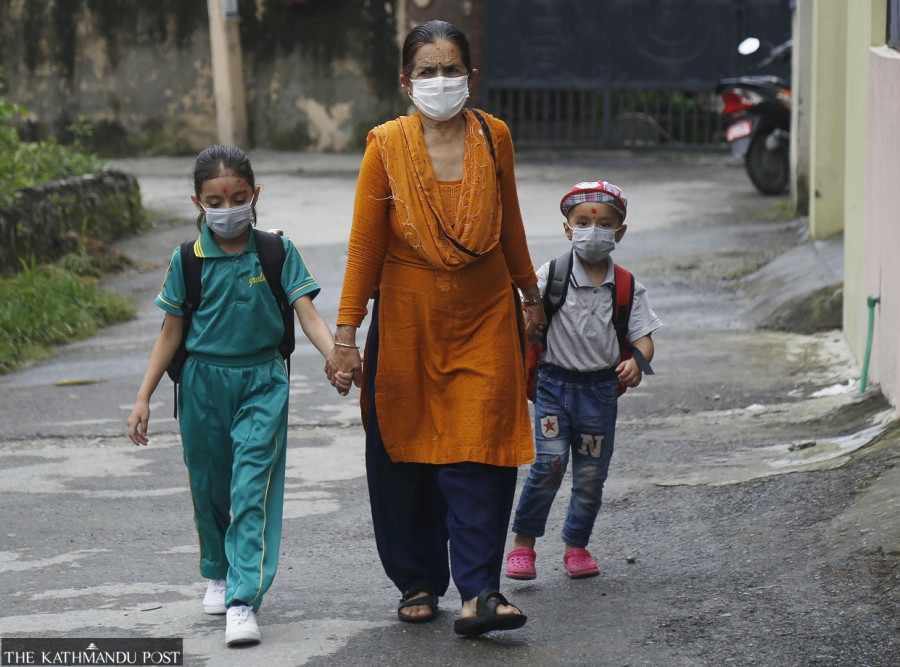Valley
Amid conflicting assessments of Covid-19 situation, a few schools reopen in Capital
Officials say they were under pressure from private school operators and a few parents to reopen schools.
Anup Ojha
Despite strong reservations by educationists and guardians against government plans to reopen schools from September 17, the District Administration Office, Kathmandu on Wednesday published a notice conditionally allowing educational institutions to resume physical classes.
Stakeholders have criticised the notice as evasive and self-contradictory.
The first sentence of the first clause of the notice says that educational institutions are not allowed to run physical classes. But the second sentence says “if physical classes must be conducted, then the metropolitan cities or the municipalities concerned should analyse the Covid-19 infection situations within their jurisdictions, ensure that all the school teachers, staffers, drivers and their helps, canteen operators and school board members have been vaccinated, prepare school operation guidelines through discussion and coordination among guardians and stakeholders and reopen the school by adhering to ‘smart lockdown’ rules in coordination with the District Covid-19 Crisis Management Centre.”
“The notice is contradictory and unclear,” said Suprabhat Bhandari, chairperson of the Guardians Federation Nepal. “First it says schools can’t reopen and then says they can.”
From the beginning, Bhandari has been voicing his opposition to the idea of reopening schools at least in Kathmandu Valley citing the high Covid infection rate.
He said there is no point in reopening schools and exposing the children to Covid-19 risk now as the month-long Dashain and Tihar festival vacations are just three weeks away.
On Friday, the country reported 1,558 new coronavirus cases with 10 Covid-related fatalities. The Kathmandu Valley recorded 397 new infections in the past 24 hours. Of these, 274 cases were confirmed in Kathmandu, 70 in Lalitpur and 53 in Bhaktapur districts.
Gobinda Prasad Rijal, the newly-appointed chief district officer of Kathmandu, however, said the statement was a continuation to the earlier announcement of the District Administration Office.
“I don’t think many schools reopened on Friday. There are 11 municipalities in Kathmandu and we are collecting information on how many schools resumed physical classes. We are equally concerned about children’s safety,” said Rijal.
Ram Prasad Subedi, the chief of Kathmandu Metropolitan City’s Education Department, said the City is under immense pressure from private school operators’ organisations—PABSON and N-PABSON—and even some parents from public schools to reopen schools.
“The City had a meeting on Thursday in the presence of Mayor Bidya Sundar Shakya, deputy Mayor Hari Prabha Khadgi, principals of 30 schools, parents and other stakeholders. We have decided to monitor the infrastructure of schools before allowing them to reopen,” said Subedi.
“We may allow schools to resume in-person classes only after Dashain, but there is immense pressure from various sides to allow reopening as soon as possible.”
Meanwhile, Lalitpur Metropolitan City reopened its schools from Friday citing low Covid-19 infection rate there.
“The Covid-19 infection rate is comparatively low in our city so we have decided to allow physical classes by ensuring that the health protocols are strictly followed by all school staffers and students,” said Lalitpur Mayor Chiri Babu Maharjan. He also admitted that his office was under immense pressure from both school operators and parents to permit physical classes.
“Many parents complained that they had to skip their jobs to tend to their children at home and help them with online studies, so we decided to reopen schools with strict adherence to safety protocol,” said Maharjan.
But Health Ministry officials citing active Covid-19 cases in Kathmandu, which are still above 3,000, advise against resuming physical classes.
“Kathmandu has a dense population so it is still not safe to allow crowding immediately. At least the schools should wait until after Dashain,” said Dr Krishna Prasad Paudel, spokesperson for the Health Ministry.
He further said the ministry has authorised local bodies to make their own decisions based on the local Covid-19 infection situations. “It would be relatively easier to enforce health protocols in schools with fewer students and bigger classrooms. It is up to the local authorities to assess the situation and issue permissions,” said Paudel.
Although the Kathmandu Metropolitan City itself has not published any notice yet to allow resumption of classes in person, on Friday a few parents in Kathmandu were seen on the road taking their kids to school.
However public health experts have been advising otherwise.
Dr Sher Bahadur Pun, chief of the Clinical Research Unit at Sukraraj Tropical and Infectious Disease Hospital, Teku, says schools should wait at least until Dashain because more people will be vaccinated by then.
The government aims to raise vaccination coverage to 33 percent by Dashain.
“When more people are vaccinated the risk of infection lessens. So the coming three weeks are crucial,” said Pun.
On Friday a consignment of 4.4 million doses of the Vero Cell vaccine arrived in Kathmandu. The country has received a total of 17,757,590 doses of vaccines to date.
The record of the Ministry of Health and Population shows a total of 55,07380 people across the country have been fully vaccinated as of Friday. Similarly, 6,083,124 have received their first dose of Covid-19 vaccines.




 11.84°C Kathmandu
11.84°C Kathmandu.jpg)














